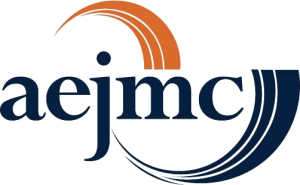AEJMC and ASJMC joint statement supporting the use of the title of “doctor” for those who have earned a terminal degree beyond the master’s level and condemning all forms of misogyny
CONTACT: Tim Vos, Michigan State University, 2020-21 AEJMC President and Gracie Lawson‐Borders, Howard University, 2020-21 ASJMC President and Jerry Crawford, University of Kansas, AEJMC PF&R Committee Chair | December 21, 2020
Association of Schools of Journalism and Mass Communication (ASJMC)
and Association for Education in Journalism and Mass Communication (AEJMC)
“Equality is the soul of liberty; there is, in fact, no liberty without it.” – Frances Wright
We the Boards of Directors of the Association for Education in Journalism and Mass Communication (AEJMC) and the Association of Schools of Journalism and Mass Communication (ASJMC) support the use of the title of “doctor” for those who have earned a terminal degree beyond the master’s level, such as a Ph.D. or Ed.D., and condemn all forms of misogyny. This statement is not merely a rebuke of one individual, who was possibly interested in drawing attention for a news cycle during a challenging time in our current American political theater. Instead, it supports academics in their use of appropriate titles and denounces attempts to belittle the contributions of scholars and teachers who are women.
Women represent a majority of educators in many journalism and mass communications subfields in the academy and in many individual college and university programs. They are champions of free speech and expression. Yet they – like women with terminal degrees in other fields, including Dr. Jill Biden – sometimes face challenges male colleagues do not in getting students, members of the public, and others to refer to them in professional modes of address.
Dr. Jill Biden has devoted her life to being an educator. She has made the all-too-familiar sacrifices women have had to make in maintaining a family and a career. She has been a champion of the American military, women’s issues, and, yes, the importance of life-long learning for many adults looking to reach for the American Dream through education. She does not need her title as First Lady/spouse of the President to define her. Her authenticity and worldview have defined her. Her life, as an educator, mother, stepmother, and grandmother define her. No title. No grandstanding. She simply worked hard, studied, cared about a topic – education – and earned her doctorate in that discipline.
We are not writing to defend one terminal degree over another degree. We understand there are medical doctors, doctors of philosophy, doctors of law, and others. Each are worthy of the rights and privileges bestowed on the degree. For those who refuse to recognize the title for those outside of the medical field, the question is “Why?”
One of the daughters of Dr. Martin Luther King, Jr., Bernice King, commented on her Twitter account, “My father was a non-medical doctor. And his work benefitted humanity greatly. Yours does, too.” Dr. Biden does not need to be defended. Forty-eight years after the failure to pass the Equal Rights Amendment demonstrates why we need to defend the rights of all women to be seen as equals in the workplace and throughout society. No attempts at being humorous or to diminish women should be tolerated.
America has shown the ability to correct and change when the rights of the underrepresented have been trampled. If not now, when?
Journalists know words have power. They have meaning. The messages they convey are able to portray groups as different and not as important as the majority. Women, individuals with disabilities, people of color, LGBTQ people and those within marginalized socio-economic groups know the power of these words. Research has shown, through the years, that media messages help to form how people see and think of others, and themselves.
News organizations and multimedia outlets, as well as those in the academy who are teaching the next generation of communications leaders, should do more than be reactive to destructive words. What is needed is an authentic and steady portrayal of all people and groups as equals in society. It should be acknowledged that The First Amendment allows those to share their voices to ridicule and minimize. It also allows others to rebut that speech with more speech. Moreover, misogynistic, anti-intellectualism and reinforcement of racial and gender hierarchies may create a buzz for a day, or even a week, but those messages should be dispelled by the truth and fact-based messages we see in everyday news coverage.
Journalism can play an important part in this work. Many of the stylebooks and traditions in newsrooms and editorial decisions are outdated and archaic. This needs to be addressed by including new standards – use of non-binary descriptors, race, cultural, and other societal changes – as part of a more inclusive framework.
This is worthy of discussion and it will take partnerships with other stakeholders to make this work.
AEJMC and ASJMC are primed to assist in this important conversation. In accordance to one of the Core Values of AEJMC, which focuses on Caring, “Members act with respect, sensitivity, consideration of others, compassion, and mercy. We try to protect others from abuse and coercion.”
We stand ready.
________________________________________
Association for Education in Journalism and Mass Communication (AEJMC)
The Association for Education in Journalism and Mass Communication (AEJMC) is a nonprofit organization of more than 3,700 educators, students and practitioners from around the globe. Founded in 1912, by Willard Grosvenor Bleyer, the first president (1912-13) of the American Association of Teachers of Journalism, as it was then known, AEJMC is the oldest and largest alliance of journalism and mass communication educators and administrators at the college level. AEJMC’s mission is to promote the highest possible standards for journalism and mass communication education, to encourage the widest possible range of communication research, to encourage the implementation of a multi-cultural society in the classroom and curriculum, and to defend and maintain freedom of communication in an effort to achieve better professional practice, a better informed public, and wider human understanding.
Association of Schools of Journalism and Mass Communication (ASJMC)
ASJMC is a non-profit, educational association composed of some 190 JMC programs at the college level. The majority of the association’s members are in the United States and Canada. ASJMC promotes excellence in journalism and mass communication education. Founded in 1917, ASJMC works to support the purposes of schools of journalism and mass communication in order to achieve the following goals: to foster, encourage and facilitate high standards and effective practices in the process and administration of education for journalism and mass communication in institutions of higher learning; to cooperate with journalism and mass communication organizations in efforts to raise professional standards and promote a public understanding of the role of journalism and mass communication in a democratic society; and to support and participate in the accreditation process of journalism and mass communication units through the Accrediting Council on Education in Journalism and Mass Communications (ACEJMC).








